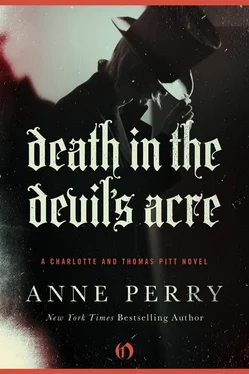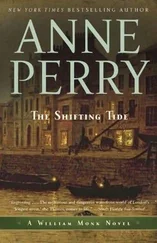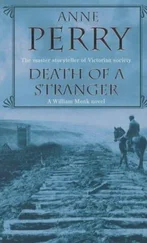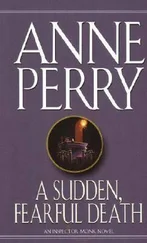Anne Perry - Death in the Devil's Acre
Здесь есть возможность читать онлайн «Anne Perry - Death in the Devil's Acre» весь текст электронной книги совершенно бесплатно (целиком полную версию без сокращений). В некоторых случаях можно слушать аудио, скачать через торрент в формате fb2 и присутствует краткое содержание. Жанр: Исторический детектив, на английском языке. Описание произведения, (предисловие) а так же отзывы посетителей доступны на портале библиотеки ЛибКат.
- Название:Death in the Devil's Acre
- Автор:
- Жанр:
- Год:неизвестен
- ISBN:нет данных
- Рейтинг книги:4 / 5. Голосов: 1
-
Избранное:Добавить в избранное
- Отзывы:
-
Ваша оценка:
- 80
- 1
- 2
- 3
- 4
- 5
Death in the Devil's Acre: краткое содержание, описание и аннотация
Предлагаем к чтению аннотацию, описание, краткое содержание или предисловие (зависит от того, что написал сам автор книги «Death in the Devil's Acre»). Если вы не нашли необходимую информацию о книге — напишите в комментариях, мы постараемся отыскать её.
Death in the Devil's Acre — читать онлайн бесплатно полную книгу (весь текст) целиком
Ниже представлен текст книги, разбитый по страницам. Система сохранения места последней прочитанной страницы, позволяет с удобством читать онлайн бесплатно книгу «Death in the Devil's Acre», без необходимости каждый раз заново искать на чём Вы остановились. Поставьте закладку, и сможете в любой момент перейти на страницу, на которой закончили чтение.
Интервал:
Закладка:
They sat in silence. Perhaps in some obscure way they had half imagined it was not really the same man. Now it was different. It was undeniably a person they had known, had lived with and seen every day, even if as a servant he was merely a part of the household appurtenances, not an individual like themselves.
“Poor devil,” Brandy said at last.
“Do you think they’ll ever find who did it?” Ross asked, turning to look at Balantyne. His expression was very intense. “If he was trading in women, one has a certain understanding for whoever killed him. It has to be as low as a man can sink, this side of insanity.”
“The trade in children is the lowest,” Brandy said quietly. “Especially in boys.”
Ross winced. “Oh, God!” he breathed out. “I hadn’t even thought of that. How criminally ignorant we are! I cannot imagine what brings a human being to do such things. And yet there must be thousands who do, here in my own city. And I may pass them in the street every day of my life.”
“In boys,” Balantyne repeated, not entirely as a question. After thirty years in the army, he could not help being aware of the appetites and aberrations of men far from home, under pressure of war. Presumably such hungers were latent before loneliness and the absence of women brought them to the point of physical indulgence. But he had not thought of anyone earning a living by selling the bodies of children for such acts. It was beyond his capacity to comprehend the mind of such a person.
“Did Max deal in boys?” he asked.
“Women, I think,” Brandy replied. “At least that’s what the newspapers said. But perhaps they would have avoided mentioning it if he had used boys. People don’t want to know about the trade in children. Adult women we can blame, say they are immoral, and anything that happens to them is beyond society’s responsibility. Prostitution is as old as mankind, and will probably last as long. We can wink at that-even well-bred women affect not to know. That way they are not required to react. Ignorance is a most effective shield.”
Balantyne suddenly thought how little he really knew Brandy. There was anger in him, and bitterness he had never recognized before. Years had slipped by, and because Balantyne himself felt that he had barely changed, he assumed that Brandy had not changed either. The difference between forty-five and fifty was nothing; the difference from twenty-three to twenty-eight could be all the world.
He looked at his son, at the line of his brow and nose, utterly different from Alan Ross: very dark, smooth straight lines, and that stubborn, emotional mouth. One imagines vaguely that one’s son will be like oneself. But had Brandy ever been much like him? Thinking about it now-perhaps not?
“Are we as shallow as that?” he said aloud.
“Defensive,” Brandy answered. “Self-preserving.”
Alan Ross ran his hand over his hair. “Most of us avoid looking at the unbearable,” he said so quietly they could only just hear him. “Especially when there is nothing we can do about it. You can’t blame a woman who doesn’t choose to know that her husband uses a prostitute-particularly if that prostitute is a child. To accept that the child is also a boy would force her to leave him. We all know that divorce ruins a woman. Even to quite moderate society she ceases to exist. She would be an object of intolerable pity, not to mention the obscene imaginations and suggestions of the less charitable. No.” He shook his head in a fierce little gesture. “Her only option is to connive at his secrecy, and never in any circumstances allow herself to kill the last precious doubt. There is nothing else she can afford to do.”
For once, Brandy was silenced.
Balantyne stared at the flames of a candelabra. He tried to imagine what it might be like, trapped in such a relationship, suspecting and yet knowing you dare not acknowledge such a truth. In fact, for your own survival, and perhaps the survival of your children, you must be the most ardent accomplice in hiding it. It had never occurred to him that Augusta was anything but a virtuous and satisfied wife. Was that insufferably complacent of him-blindly, stupidly insensitive? Or was it simply a measure of his trust in her, even perhaps a kind of happiness? He had never used a prostitute in his life, even in his early army days. There had been the occasional lapse, of course, before he was married-but for mutual pleasure, never for money. But after that he had not ever questioned his moral duty to abstinence when either he or Augusta were away from home or indisposed. Augusta was not a passionate woman; perhaps decency precluded it? And he had long ago disciplined himself to master his own body and its demands upon him; such control was part of the mind of a soldier. Exhaustion, pain, and loneliness must be governed.
Alan Ross sat back. “I’m sorry,” he said, running his hand over his hair again. “It was not a suitable subject to discuss. I have spoiled your dinner.”
“No.” Balantyne swallowed and dragged his thoughts back. “What you said is true,” he corrected quickly. “The situation is hideous. But you cannot blame people for not acknowledging what can only destroy them. God knows-a man who procures prostitutes is barely fit to live. But murder cannot be the answer. And this mutilation is barbaric.”
“Have you ever been to the Devil’s Acre, Papa?” Brandy spoke without fire now, his face somber. “Or any of our other slums?”
Balantyne knew what he was thinking. In the fight for survival in grinding, hopeless poverty, what else could people be but barbaric? Memories of army camps came back to him, of the Crimea, of Scutari, of sudden and violent death-of what men do in towns during the weeks and the nights waiting for battle. Any day their bodies could be mangled, faceless under the sun of Africa or frozen in the Himalayan snows. If he did not really know Brandy, neither did Brandy know him.
“I’ve been thirty years in the army, Brandy,” he replied. “I know what can happen to people. Is that an answer?”
“No.” Brandy drank the last of his port. “Only I don’t find it acceptable to avoid the question anymore.”
Balantyne stood up. “We had better rejoin the ladies in the withdrawing room before they realize we have been discussing this subject again.”
Alan Ross rose also. “I know a member of Parliament I’d like to see. Do you wish to come, Brandy? We might be of assistance to him. I hear he has some sort of bill to put before the House.”
“What about?” Brandy followed them.
“Child prostitution, of course,” Ross replied, opening the door. “But don’t mention it in front of Christina, if you don’t mind. I think the subject is one that distresses her.”
Balantyne was pleased. He had thought from her remarks that she merely considered the matter in ill taste rather than painful. This was entirely different. He was ashamed for having misjudged her. But there was nothing he could say; to apologize would only betray the thought.
Just before midnight, when the others had gone, Balantyne followed Augusta slowly up the stairs. “You know, I like Alan Ross better each time I see him. Christina is very fortunate,” he remarked.
She turned and looked at him coldly. “And what do you mean by that?”
“Precisely what I said-that with the best intention, one may still find that a person is not what one had hoped. Alan Ross is even more than we might have presumed on our early acquaintance.”
“Not on mine,” she answered firmly. “Do you imagine I would have permitted my daughter to marry a man of whose worth I was not sure?”
He was surprisingly stung, and spoke the truth without thinking. “It is difficult to know how much choice we had in the matter with Christina.”
Читать дальшеИнтервал:
Закладка:
Похожие книги на «Death in the Devil's Acre»
Представляем Вашему вниманию похожие книги на «Death in the Devil's Acre» списком для выбора. Мы отобрали схожую по названию и смыслу литературу в надежде предоставить читателям больше вариантов отыскать новые, интересные, ещё непрочитанные произведения.
Обсуждение, отзывы о книге «Death in the Devil's Acre» и просто собственные мнения читателей. Оставьте ваши комментарии, напишите, что Вы думаете о произведении, его смысле или главных героях. Укажите что конкретно понравилось, а что нет, и почему Вы так считаете.












